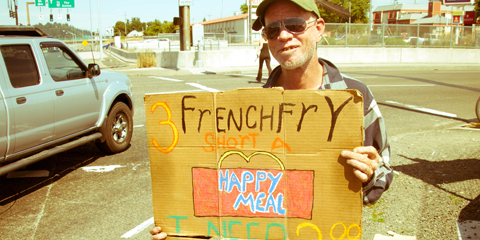
By Charles Cates. Photography by Andrew Roles.
Years ago, I attended Western Oregon State College in Monmouth. Actually, attended is an exaggeration but that is neither here nor there. Monmouth is a quiet town as college communities go. Even buying a beer required taking a short drive to Independence as Monmouth is a “dry” town.
Any excuse would be good enough for me to fire up my ’64 Bug and drive to Portland for a night on the town. Talking Heads playing? Let’s go. My friend Dave is mixing up some martinis? Done.
I don’t have total recall of my college years. My high school years are a bit faded and there is little I choose to remember about my earlier years. Not that youth was bad, don’t get me wrong. There is just little of it that stands out.
One thing that I definitely don’t remember from those college days and the years preceding is crossing paths with panhandlers at every corner with their cardboard signs. I imagine that most of WOH readers take it for granted that on-ramps and off-ramps have always been decorated with homeless people and their “Anything Helps – Will Work for Food” signs. But that is not the case. For that matter, I don’t recall seeing people sitting at bus stops suffering from dementia.
As I was growing up in Los Angeles, circa ‘60’s and ‘70’s, cardboard signs were reserved for hitchhikers trying to get to Montana or Oregon. If you saw a person sleeping in the street, you would check them to see if they were in medical need. And on the rare occasion that someone came up to you asking for some gas money, you would give them a ride to the gas station because they were really out of gas and did not have cash. A person talking to themselves would soon be stopped by police and taken away assuming they needed care.
What happened between now and then? How did the landscape change to include the shopping carts, sleeping bags, piles of water bottles and the faceless people that generate these monuments?
If you have lived long enough, you can remember the first time you saw a person holding a cardboard sign. You responded by digging into your pocket and giving the person a couple of bucks, wishing them well. If you are old enough, you recall the first time a man came up to you in the grocery parking lot asking for gas money. “My wife is in the car and I need to get her to the doctor,” he would say… And you believed him.
In 1981, Ronald Reagan took office as President. Having defeated then President Jimmy Carter, President Reagan came into office with a vision of how he would reduce government debt and stimulate the economy. “Reaganomics”, as it was called, was based on the principal of minimizing government’s role through deregulation and reducing the tax burden on large corporations. This two pronged approach would allow business to grow, creating jobs which would increase revenue through income tax and reduce the government’s debt. In addition, Reagan was a big proponent of defense spending, which would also stimulate economic growth through weapon and defense system productions.
 “Reaganomics” also called for the privatization of some of the institutions that were costing the government money. This included the overburdened mental health programs and indigent care. Mental health, drug rehabilitation was deemed best left to the private sector while the indigent can be cared for by church and charitable institutions. We are, after all, a Christian nation.
“Reaganomics” also called for the privatization of some of the institutions that were costing the government money. This included the overburdened mental health programs and indigent care. Mental health, drug rehabilitation was deemed best left to the private sector while the indigent can be cared for by church and charitable institutions. We are, after all, a Christian nation.
It was around the mid ‘80’s when I recall starting to see people with signs on street corners. These were rare occasions at first but by 1990 it had become cliché to the point where you no longer believed the sign. By the early ‘90’s, you learned to avert your gaze, choose the middle lane and time your speed to miss the red lights. You also learned that calling the police to assist with the person that is muttering to themselves would be a waste of time.
It begs the question, has life improved? Did the debt go down as a result of supply side economics? Did health care improve through privatization? Has our standard of living improved over the years?
I was motivated to write this article when, a few weeks ago, I was driving home from work and saw a person walking down the street, obviously delusional. It is an uneasy feeling that you get when you see a person with no control over reality. What can you do for them? It is not by choice that they are afflicted by mental illness. Arguably, losing your mental health is the worst form of illness.
I did not stop the car. I had a cell phone, yet I did not call authorities. I did what I normally do as I pass the homeless. I averted my gaze and continued on.
That is what has changed in me over the years. Every corner has homeless people. Most, I assume, are there because they have some form of mental illness, drug or alcohol abuse. The “Will Work for Food” is assumed to be bull shit.
Now comes the worst part. With the economic depression we are in, there really are people in dire straits. There are people who will work for food. There are people who are homeless by misfortune, not drug abuse or alcohol or mental illness. I cannot tell who is who. None of us can.
We have become snow blinded by the frequency of people in need. We all would like to help the truly needy but you could go through a roll of singles each daily commute by trying to reach those in need.
This is how society has changed, I believe, as a result of “Reagonomics.” Did the government debt go down as a result of Reagan’s presidency? No. It nearly doubled compared to the Carter years. Did supply side economics prove to be the job generating mechanism it was purported to be? Well, we are all enjoying the results of that economic engine. And has the privatization of health services improved the quality of care given to those in need? Every major intersection and freeway off-ramp is clear evidence that charitable contributions and church organizations cannot make up for government funded health care.
As a society, as a human family, there are some things that we should do as a communal effort. One such thing is to care for those of us who cannot care for themselves. Quality of life, no matter how wealthy you are personally is thwarted when you are surrounded by those in need and are unable or unwilling to assist.
Imagine driving home and seeing a person on the corner asking for help. Imagine being able to discern that they are in true need and giving them a hand. Would that not be an improvement to your quality of life?
Therein lies one of the basic philosophical questions about life. Do we as a society bear some responsibility to each other? Is our life improved when those around us are well? Or do we fulfill our responsibility to society when we improve our own lot in life independent of everyone else?
These questions are faced every time we enter a presidential voting cycle. To discern which way to cast your vote is a heavy responsibility. Much like the multitude of signs you face on your daily commute that obscure your ability to see the person in need, the constant political banter obscure the fundamental questions of how will life improve or devolve over the next several years.
I would argue that as a nation in economic hardship, it is time to unite in an effort to collectively improve our lot in life. A philosophy of minimal government and deregulation has led us to the brink of a second depression. The current White House administration is faced with the battle of changing a tide that has been 30+ years in the making. It is not an easy recovery.
Whichever way you choose to vote, whatever your personal philosophy on life and responsibility is, one thing is sure. The act of voting and trying to do so in a way that is guided by your convictions is your responsibility. Cast your vote.

